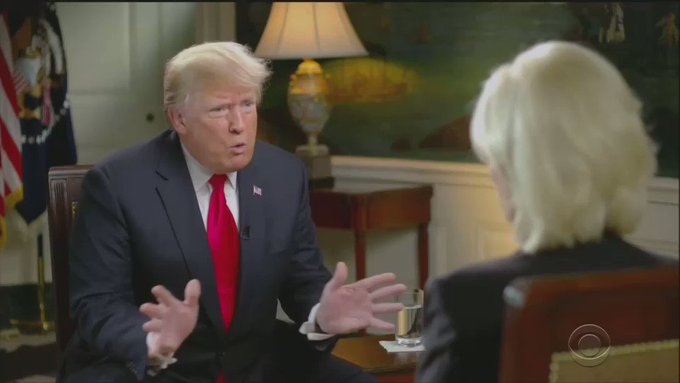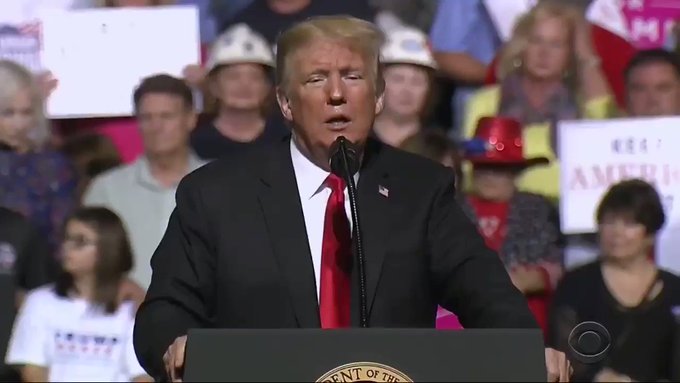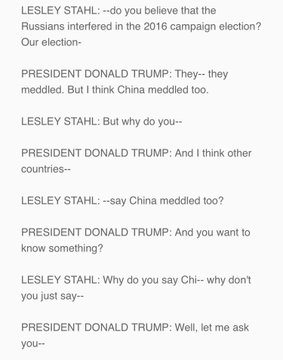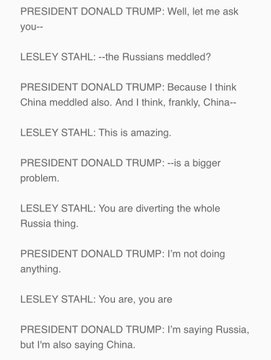Oil
Jumps After Saudi Official Floats "Trial Balloon" Op-Ed
Envisioning "Oil Weapon" Devastation
14
October 2018
WTI
Crude prices are up around 2% in the early Sunday trading after
Saudi Arabia appears to be now attempting to go on the offensive and
is lashing out as it does damage control in the aftermath of
journalist Jamal Khashoggi's alleged murder inside the Saudi
consulate in Istanbul nearly two weeks ago.
What
likely sparked the risk premium was the fact that Turki Al Dakhil,
who heads the Saudi state-owned Arabiya news network, wrote in an
article that U.S. sanctions against Saudi Arabia could wreak havoc on
the global economy by taking oil prices to $200 a barrel and
more. Faisal bin Farhan, a senior adviser to the Saudi embassy
in Washington, said on Twitter that these comments didn’t represent
the Saudi leadership.
“The most powerful weapon Saudi has is oil and its investments,” said Fawaz Gerges, a professor of international relations at the London School of Economics. “ I doubt Saudi will decrease the production of oil to the world economy because it will hurt itself and I doubt that Saudi will withdraw its investments.”
And
the reaction to the threat - though modest for now - will not please
President Trump
So
kick back and grab your popcorn: this
could be the beginning of a spat and public relations meltdown with
the U.S. as the Saudi Embassy in Washington on Sunday tweeted the
following passive aggressive statement directed
at the White House:
To help clarify recently issued Saudi statement, the Kingdom of Saudi Arabia extends it appreciation to all, including the US administration, for refraining from jumping to conclusions on the ongoing investigation.
The
kingdom now appears to be breaking under reacting to the pressure
amidst countless international reports and Western leaders all
pointing the finger at Riyadh for the pre-meditated murder of the
Washington Post columnist and US resident.
This
comes after President Trump told "60 Minutes" during a
recent interview that the
U.S. would be “very upset and angry” if the Saudi government was
behind Khashoggi's death,
and added further that there would be "severe
punishment" to follow.
But
just as interesting are the strong signals being put out via Saudi
official media. For
the first time since 1973 Saudi Arabia appears to be threatening the
oil weapon... or
at least is doing so through trusted state journalists.
On
Sunday almost simultaneous to publication the official KSA statement
confirming "its total rejection of any threats and attempts to
undermine it," the head of state-funded Al-Arabiya News, Turki
Aldakhil, published an article entitled, US
sanctions on Riyadh would mean Washington is stabbing itself.
Notably,
the article was published in English and didn't hold back in terms of
threats to both the West and global economy, warning Saudi Arabia
possesses the ability cause "an
economic disaster that would rock the entire world."
The
op-ed envisioned, or rather threatened, the following should the
White House unleash Trump's "severe punishment" on Saudi
Arabia:
- $200 a barrel oil
- a Russian base in Saudi Arabia
- Weapons contracts going to Russia and China
- Iran taking over the Middle East
- major hit to US defense contractors
- collapsing global economy
If US sanctions are imposed on Saudi Arabia, we will be facing an economic disaster that would rock the entire world. Riyadh is the capital of its oil, and touching this would affect oil production before any other vital commodity. It would lead to Saudi Arabia's failure to commit to producing 7.5 million barrels. If the price of oil reaching $80 angered President Trump, no one should rule out the price jumping to $100, or $200, or even double that figure.
But
Aldakhil quickly followed with a statement on Twitter, saying the
views reflected in his editorial are his "personal opinions"
and not the position of the official Saudi government.
Yet
it's prominently featured by the kingdom's foremost English
publication... The op-ed continued by saying, "There
are simple procedures, that are part of over 30 others, that Riyadh
will implement directly, without flinching an eye if sanctions are
imposed."
And
responding to the broadly recognized fact that both the US and UK
supply nearly the entirety of the Saudi military with hardware and
training, the Al
Arabiya chief
editor went so far as to say US sanctions would drive Riyadh into the
arms of Russia and China to fulfill its military needs.
Imposing any type of sanctions on Saudi Arabia by the West will cause the kingdom to resort to other options, US President Donald Trump had said a few days ago, and that Russia and China are ready to fulfill Riyadh’s military needs among others. No one can deny that repercussions of these sanctions will include a Russian military base in Tabuk, northwest of Saudi Arabia, in the heated four corners of Syria, Israel, Lebanon and Iraq.
He
claimed further that a break down in cooperation between Riyadh and
Washington "will
throw the Middle East, the entire Muslim world, into the arms of
Iran..."
Underscoring
the theme of Washington "stabbing itself in the back" by
retaliating for Khashoggi's death, the op-ed
continued:
It will not be strange that Riyadh would stop buying weapons from the US. Riyadh is the most important customer of US companies, as Saudi Arabia buys 10 percent of the total weapons that these US companies produce, and buys 85 percent from the US army which means what’s left for the rest of the world is only five percent; in addition to the end of Riyadh’s investments in the US government which reaches $800 billion.
The US will also be deprived of the Saudi market which is considered one of the top 20 economies in the world.
It
appears that the Saudi state is now openly "floating"
such threats under cover of their official state journalists.
No
doubt officials will deny that this is at all representative of their
stance, but we fully expect more such "private opinion"
op-eds to be circulated in the coming week. Should the Saudis and
powers that be not find
a way to vindicate Riyadh and crown prince MbS,
things are about to get messy.
Trump
Threatens China With More Tariffs, Does Not Seek Economic
"Depression"
13
October, 2018
US
equity futures dipped in the red after President Trump threatened to
impose a third round of tariffs on China and warned that Chinese
meddling in U.S. politics was a "bigger problem" than
Russian involvement in the 2016 election.
During
the same interview with CBS’s “60 Minutes”, in which Trump
threatened to impose sanctions against Saudi Arabia if the Saudis are
found to have killed WaPo reported Khashoggi, and which sent Saudi
stock plunging, Trump said he "might," impose a new round
of tariffs on China, adding that while he has "great chemistry"
with Chinese President Xi Jinping, and noting that Xi "wants to
negotiate", he doesn’t "know that that’s necessarily
going to continue." Asked if American products have become
more expensive due to tariffs on China, Trump said that "so far,
that hasn’t turned out to be the case."
"They
can retaliate, but they can’t, they don’t have enough ammunition
to retaliate," Trump says, "We do $100 billion with them.
They do $531 billion with us."
Trump
was also asked if he wants to push China’s economy into a
depression to which the US president said “no” before comparing
the country’s stock-market losses since the tariffs first launched
to those in 1929, the start of the Great Depression in the U.S.
"I
want them to negotiate a fair deal with us. I want them to open their
markets like our markets are open," Trump said in the interview
that aired Sunday. So far, the U.S. has imposed three rounds of
tariffs on Chinese imports totaling $250 billion, prompting China to
retaliate against U.S. products. The president previously has
threatened to hit virtually all Chinese imports with duties.
Asked
about his relationship with Vladimir Putin and the Kremlin’s
alleged efforts to influence the 2016 presidential election, Trump
quickly turned back to China. “They meddled,” he said of Russia,
"but I think China meddled too."
“I
think China meddled also. And I think, frankly, China ... is a bigger
problem,” Trump said, as interviewer Lesley Stahl interrupted him
for “diverting” from a discussion of Russia.
Shortly
before an audacious speech by Mike Pence last weekend, in which the
US vice president effectively declared a new cold war on Beijing (see
"Russell
Napier: Mike Pence Announces Cold War II"),
Trump made similar accusations during a speech at the United Nations
last month, which his aides substantiated by pointing to long-term
Chinese influence campaigns and an advertising section in the Des
Moines Register warning farmers about the potential effects of
Trump’s tariffs.
Meanwhile,
in a rare U.S. television appearance, China’s ambassador to the
U.S. said Beijing has no choice but to respond to what he described
as a trade war started by the U.S.
“We
never wanted a trade war, but if somebody started a trade war against
us, we have to respond and defend our own interests,” said China's
Ambassador Cui Tiankai.
Cui
also dismissed as “groundless” the abovementioned suggestion by
Vice President Mike Pence that China has orchestrated an effort to
meddle in U.S. domestic affairs. Pence escalated the rhetoric in a
speech Oct. 4, saying Beijing has created a “a whole-of-government
approach” to sway American public opinion, including spies,
tariffs, coercive measures and a propaganda campaign.
Pence's
comments were some of the most critical about China by a high-ranking
U.S. official in recent memory. Secretary of State Michael Pompeo got
a lecture when he visited Beijing days later, about U.S. actions that
were termed “completely out of line.” The tough words followed
months of increases tit-for-tat tariffs imposed by Washington and
Beijing that have ballooned to cover hundreds of billions of dollars
in bilateral trade.
During
a recent interview with National Public Radio, Cui said the U.S. has
“not sufficiently” dealt in good faith with the Chinese on trade
matters, saying “the U.S. position keeps changing all the time so
we don’t know exactly what the U.S. would want as priorities.”
Meanwhile,
White House economic director Larry Kudlow said on “Fox News
Sunday” that President Donald Trump and Chinese President Xi
Jinping will “probably meet” at the G-20 summit in Buenos Aires
in late November. “There’s plans and discussions and agendas”
being discussed, he said. So far, talks with China on trade have been
“unsatisfactory,” Kudlow said. “We’ve made our asks” on
allegations of intellectual property theft and forced technology
transfers, he added. “We have to have reciprocity.”
Addressing
the upcoming meeting, Cui said he was present at two previous
meetings of Xi and Trump, and that top-level communication “played
a key role, an irreplaceable role, in guiding the relationship
forward.” Despite current tensions the two have a “good working
relationship,” he said.
* *
*
Separately,
CBS interviewer Stahl tried to get Trump to commit to not firing
special counsel Robert Mueller, who’s leading the investigation
into Russian interference in the 2016 presidential campaign. Trump
refused to do so, telling her: "I don’t pledge anything. But I
will tell you, I have no intention of doing that. I think it’s a
very unfair investigation because there was no collusion of any
kind."
Switching
to other topics, during his discussion of Brett Kavanaugh’s
confirmation to the Supreme Court, Trump took credit for getting his
nomination through the Senate around Christine Blasey Ford’s
allegations that the judge tried to sexually assault her when they
were in high school.
Finally,
as Bloomberg
notes,
the president left the door open to reviving the practice of
separating migrant parents and their children at the Mexican border,
something the Washington Post reported last week was under
consideration within the administration: “There have to be
consequences ... for coming into our country illegally,” he said,
arguing that “part of the reason, I have to blame myself, the
economy is so strong that everybody wants to come into the United
States.”
Pressed
again, he added: “You can’t say yes or no. What I can say is
this: There are consequences from coming into a country, namely our
country, illegally.”














No comments:
Post a Comment
Note: only a member of this blog may post a comment.